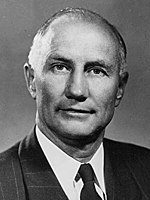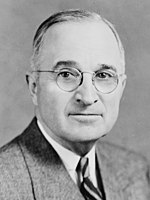1948_United_States_presidential_election_in_Mississippi
1948 United States presidential election in Mississippi
Election in Mississippi
The 1948 United States presidential election in Mississippi took place on November 2, 1948, in Mississippi as part of the wider United States presidential election of 1948.
The Democratic Party candidate, South Carolina governor Strom Thurmond, overwhelmingly won Mississippi against fellow Democrat, incumbent President Harry S. Truman by a margin of 148,154 votes, or 77.08%. Although Truman was the national Democratic Party candidate, Thurmond managed to be placed on the ballot in Mississippi, South Carolina, Louisiana, and Alabama as the official "Democratic" candidate. Outside of these four states, Thurmond was forced to run under the label of the States’ Rights Democratic Party. The Republican Party candidate, New York governor Thomas E. Dewey, had no impact on the race in Mississippi, only obtaining 5,043 votes total, or 2.62 percent of the popular vote, and failing to attract even ten percent of the vote in any Mississippi county.
Mississippi in this era was a one-party state dominated by the Democratic Party, so that the only competitive contests were Democratic primaries that were by law excluded to non-whites until the landmark court case of Smith v. Allwright. Ever since seeing the potential effect on the United States' image abroad (and ability to win the Cold War against the radically egalitarian rhetoric of Communism)[1] of the beating and blinding of Isaac Woodard three hours after being discharged from the army, President Truman was attempting to launch a Civil Rights bill, involving desegregation of the military. Southern Democrats immediately made such cries as "unconstitutional", "Communist inspired," "a blow to the loyal South and its traditions," "unwarranted and harmful," "not the answer," and "does irreparable harm to interracial relations".[2]
Southern Democrats walked out at the party's national convention in Philadelphia[3] because of Truman's endorsement of civil rights for African Americans, and Mississippi, the state with the highest proportion of blacks in its population, was alongside neighbouring Alabama the most opposed to Truman.[2] Indeed, whereas only half of Alabama's delegation walked out, all of Mississippi's did.[4] This segregationist faction met on July 17, 1948, in Birmingham, Alabama, nominating South Carolina governor Strom Thurmond as its nominee for president. Mississippi governor Fielding L. Wright was nominated for vice president. Mississippi pledged its Democratic electors to Thurmond on August 3 without debate,[5] and although a group of nine students from Mississippi State College qualified as Truman/Barkley electors after that ticket had sought to find electors from University of Mississippi students, all the nine nominated Truman electors personally supported the Dixiecrats rather than the national party.[6]
92% of white voters supported Thurmond.[7]


